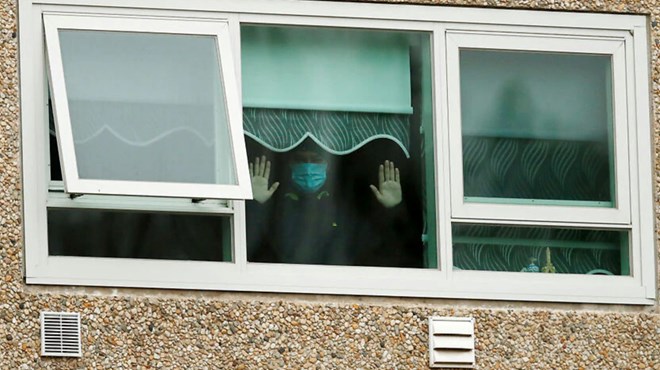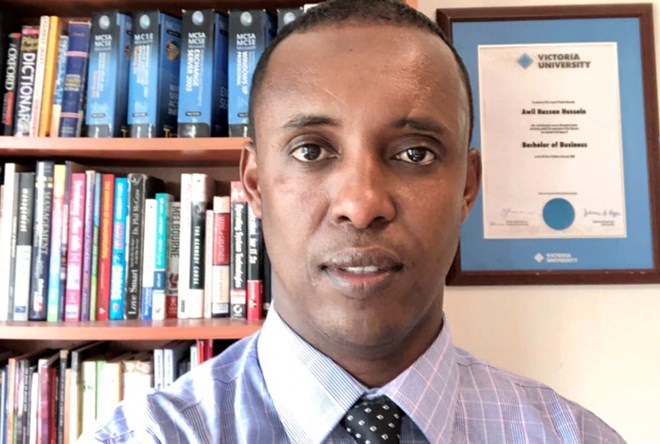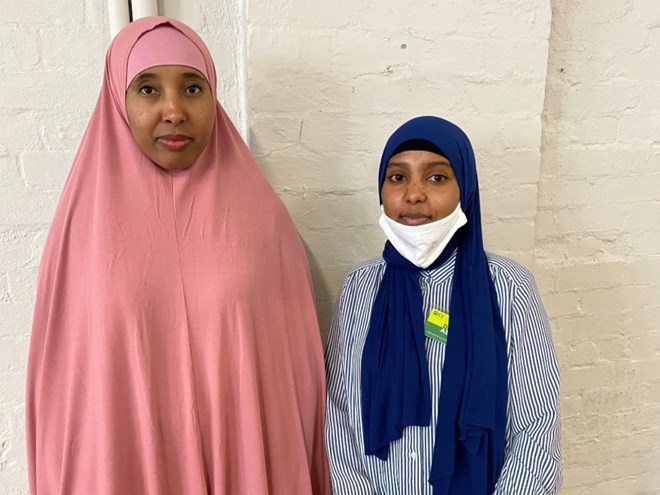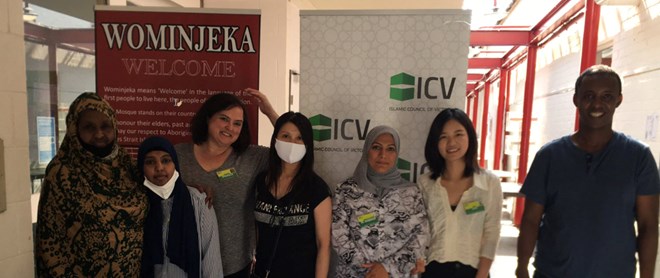
By Hassan Jama
Tuesday January 19, 2021

A man is seen looking out a window of the Flemington Towers Government Housing complex. Source: Getty Images
Residents of Melbourne’s public housing towers – placed under the toughest coronavirus lockdown in the country – are being offered culturally appropriate services to recover from the "traumatising" experience.Many residents of Melbourne’s public housing towers subjected to a strict lockdown during Victoria’s fatal second coronavirus wave say they are still reeling from trauma.
Awil Hassan, who lives in one of the nine towers that were locked down in July 2020 following a coronavirus outbreak, recalls the suffering his family and other residents went through at the time.
“Our freedom was taken away; we were locked down for two weeks, and couldn’t go out, even for essentials,” he says.“There were people who needed medication, like my Mum, but couldn’t get it.”
He says he will continue to feel its effects for many years to come.
“Psychologically, it will take a long time, possibly many years, to recover. We don’t know the long-term effects.”

Public housing tower resident Awil Hassan.Source: Awil Hassan
Islamic Council of Victoria, the peak body for Muslim organisations in the state, is now advocating for residents like Mr Hassan and is acting as a bridge for them to access culturally and religiously appropriate services.Under Working for Victoria project, the ICV has employed six bi-cultural workers from the same cultural backgrounds as the residents to overcome potential barriers that could impede residents accessing services in the areas of education, housing and mental health.
Project coordinator at ICV, Nina Springle says that mainstream services couldn’t help the tower residents despite their good intentions and best efforts.
“I think there is a gap: a lot of mainstream services assume things about CALD backgrounds that aren’t always accurate,” she says.
“Mental health is a great example. Mainstream services or even governmental departments will assume if communities are given access to mental health professionals, that will fix the problem.”
"What they fail to recognise is some cultures don’t actually recognise mental health as an issue at all. They would rather have pastoral care, they would speak to their Imam, they speak to their spiritual leader; they don’t see mental health as a thing."Ms Springle says hiring bicultural and bilingual workers aims to better communicate with residents and find solutions to their problems.
Dima Abdu – a worker involved in the project – is herself a resident of one of the nine towers. She says she understands the most appropriate manner to support the residents and can fill the gap left by mainstream services.
“There is a lot of miscommunications that occur; the way we communicate with residents is different, and the language barrier isn’t there,” she told SBS Somali.
“I think it’s a matter of redirecting the focus, looking at things through a different lens, one that doesn’t harm each other. We look to collaborate with residents rather than working on a charity basis.”

Dima Abdu (right) and Hafsa Mohamed are working with the Islamic Council of Victoria and connect residents with culturally appropriate services. Source:
SBS Somali
Ms Abdu was also confined to her house's four walls within the tower when the nine public housing towers were placed under hard lockdown.She says while the residents had already been grappling with various challenges, the lockdown has made things worse.
“I think what really hurt me was the image: they gave out this image of people who are incompetent whereas a lot of them are competent people but not in a way they expect,” she says.
“A lack of respect they got from certain agencies was not nice. It really impacted me.”
She says these communities are very “tight-knit” and support each other.
“One thing is, these communities are tenacious, they are strong, but I feel they lack some resources they desperately need,” she says.
Victorian ombudsman Deborah Glass found that the order to lock down the towers in North Melbourne and Flemington breached the human rights law.
She said a temporary lockdown was warranted, but the timing was not based on direct health advice.
"The rushed lockdown was not compatible with the residents' human rights, including their right to humane treatment when deprived of liberty," Ms Glass said.

ICV staff and residents at North Melbourne community centre. Source:
SBS
Hafsa Mohamed, another bicultural worker with the project, says the COVID-19 pandemic has impacted almost everyone in the towers.“Everybody is isolated by COVID, and isolation has a heavy impact on the mental health of not only adults, but children are also very much affected,” she says
“They are facing many challenges, especially in housing with many waiting for many years even as their family expanded but still have the same houses.”
The project aims to help families and residents navigate their way through the challenges, including education, mental health, family support, material aid, and employment. Some unofficial data suggests 70 per cent unemployment among residents of the nine towers.
Project coordinator Nina Springle says the role of the workers is to connect residents with appropriate services.
“Throwing all the resources at what we consider to be a mental health specialist in the west is a waste of money in many instances because the community just don’t relate to that idea,” she says.
“We have the capacity to find culturally appropriate services. You can have all the services in the world, but if people don’t want to use them, then they are useless.”